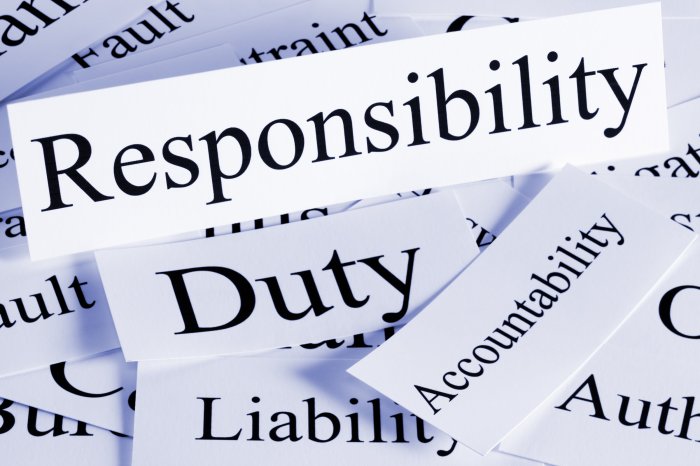Which of the following is not a traveler responsibility? This question raises important considerations for individuals embarking on journeys. Understanding the boundaries of traveler responsibilities is crucial for ensuring a safe, enjoyable, and respectful travel experience.
Travelers bear various responsibilities, such as adhering to local laws, respecting cultural norms, and preserving the environment. However, certain actions or behaviors fall outside the realm of traveler obligations. Identifying these non-responsibilities empowers travelers to navigate their journeys with clarity and avoid unnecessary burdens.
Responsibilities of Travelers

As individuals who embark on journeys, travelers hold a fundamental responsibility to ensure the safety, well-being, and respect for the destinations they visit. This encompasses a wide range of actions and behaviors that contribute to a positive and responsible travel experience.
Examples of Traveler Responsibilities
- Adhering to local laws and customs
- Respecting the rights and privacy of others
- Preserving and protecting natural and cultural heritage
- Minimizing environmental impact
- Supporting local communities through ethical and sustainable practices
Fulfilling these responsibilities is not only a matter of personal ethics but also a legal obligation in many jurisdictions. By upholding these principles, travelers contribute to the sustainability and preservation of destinations, ensuring their continued enjoyment for generations to come.
Exemptions from Traveler Responsibilities

While the aforementioned responsibilities generally apply to all travelers, there may be certain circumstances where exemptions or modifications are granted. These exemptions typically arise from factors beyond the traveler’s control.
Examples of Exemptions
- Emergencies or unforeseen circumstances that necessitate immediate action
- Cultural or religious practices that conflict with certain traveler responsibilities (e.g., dietary restrictions)
- Government regulations or restrictions that override traveler responsibilities (e.g., mandatory mask-wearing)
It is important to note that exemptions do not absolve travelers from their fundamental responsibility to act in a respectful and responsible manner. Rather, they provide a framework for understanding and accommodating the complexities of travel.
Non-Responsibilities of Travelers

It is equally important to recognize that there are certain actions or behaviors that are not the responsibility of travelers. These non-responsibilities typically fall outside the scope of a traveler’s influence or control.
Examples of Non-Responsibilities
- Ensuring the safety and security of destinations (responsibility of governments and local authorities)
- Resolving political or social conflicts (responsibility of policymakers and international organizations)
- Addressing global environmental issues (responsibility of international cooperation and collective action)
While travelers may play a role in advocating for these issues, they are not directly responsible for solving them. Recognizing these non-responsibilities helps travelers focus on the actions they can take to minimize their impact and contribute positively to the destinations they visit.
Consequences of Not Fulfilling Traveler Responsibilities
Failure to fulfill traveler responsibilities can have significant consequences, both for the traveler and the destination. These consequences can range from minor inconveniences to serious legal repercussions.
Examples of Consequences
- Fines or imprisonment for violating local laws
- Damage to reputation or loss of travel privileges
- Harm to the environment or cultural heritage
- Negative impact on local communities
- Reduced enjoyment of the travel experience
By understanding the potential consequences, travelers are more likely to take their responsibilities seriously and act in a manner that respects both the destination and themselves.
Exceptions and Special Circumstances: Which Of The Following Is Not A Traveler Responsibility
In certain exceptional circumstances, traveler responsibilities may be altered or modified. These exceptions are typically based on factors that are beyond the traveler’s control.
Examples of Exceptions, Which of the following is not a traveler responsibility
- Natural disasters or other emergencies that necessitate the suspension of certain responsibilities
- War or political unrest that makes it impossible to adhere to certain responsibilities
- Medical conditions or disabilities that prevent travelers from fulfilling certain responsibilities
It is important to note that exceptions do not absolve travelers from their fundamental responsibility to act in a respectful and responsible manner. Rather, they provide a framework for understanding and accommodating the complexities of travel.
FAQ Insights
Is it a traveler’s responsibility to ensure the safety of their belongings?
No, while travelers should take reasonable precautions, the safety of belongings is ultimately the responsibility of transportation providers, accommodation establishments, and local authorities.
Are travelers responsible for resolving political conflicts in their destinations?
No, travelers should avoid involvement in political matters and seek guidance from local authorities or diplomatic missions in case of concerns.